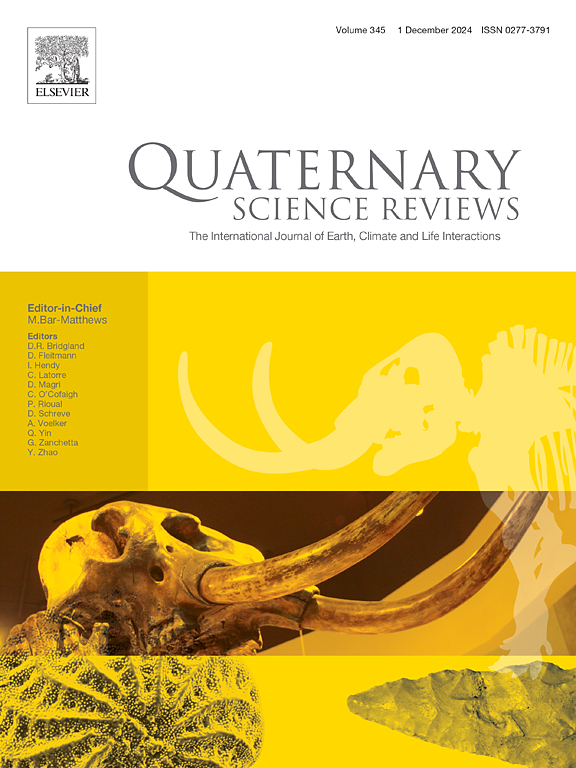完善阿根廷潘帕斯草原中更新世/晚更新世化石群的年代学
IF 3.2
1区 地球科学
Q1 GEOGRAPHY, PHYSICAL
引用次数: 0
摘要
阿根廷潘帕斯草原的中更新世和晚更新世大型和超大型哺乳动物记录属于博纳期和卢贾尼期/时代,尚未用标准的数字辐射测量方法对其进行充分的年代测定。阿根廷和其他南美化石地点的参考时间尺度主要基于哺乳动物的动物群含量(生物地层单位或生物区)。最近,我们采用电子自旋共振(ESR)、U 系列、光激发发光(OSL)和放射性碳测年法,对布宜诺斯艾利斯省的三个中、晚更新世动物化石遗址进行了测年。地理位置遥远的地点(Salto de Piedra、Campo Spósito 和 Cascada de Paleolama)出土了代表卢贾尼安和博纳里安阶段/时代的化石群。经过系统发掘的皮德拉盐湖(Salto de Piedra)记录了最完整的化石序列之一,我们的研究结果表明,它至少沉积于公元前 127.4 ka(最小年龄;晚更新世,MIS 5)和公元前 4.8-4.3 cal ka(中全新世,MIS 1)之间。Campo Spósito 下层(与 "El Tala "单元相对应)通过 ESR/U 系列牙齿测年被确定为 188 ka。最后,位于序列底部的 Cascada de Paleolama 单元 D 的年代为 143 ± 20 ka(晚更新世,MIS 5/6)。新的测年结果为博纳里亚期和卢贾尼期/年代提供了一个重要的额外年龄控制,使我们能够更好地确定和校准Equus neogeus、Megatherium americanum生物区的界限,并更好地约束用于构建当地生物地层框架的其他指数类群。我们的研究结果表明,有必要对潘潘地区第四纪生物区系进行修订。本文章由计算机程序翻译,如有差异,请以英文原文为准。
Refining the chronology of Middle/Late Pleistocene fossil assemblages in the Argentine Pampas
Middle and Late Pleistocene large and mega-mammal records of the Argentine Pampas, belonging to the Bonaerian and Lujanian Stages/Ages, have not yet been adequately dated by standard numerical radiometric methods. Reference timescales for Argentina and other South American fossil sites are mainly based on the mammalian faunal content (biostratigraphic units or biozones). We have recently dated three Middle and Late Pleistocene faunal sites located in the Buenos Aires Province using Electron Spin Resonance (ESR), U-series, Optically Stimulated Luminescence (OSL) and radiocarbon dating. The geographically distant sites (Salto de Piedra, Campo Spósito and Cascada de Paleolama) have yielded fossil assemblages representative of the Lujanian and Bonaerian Stages/Ages. Salto de Piedra, systematically excavated, records one of the most complete fossil sequences and our results indicate that it deposited between at least 127.4 ka (minimum age; Late Pleistocene, MIS 5) and 4.8–4.3 cal ka BP (Middle Holocene, MIS 1). Campo Spósito lower level (corresponding to ‘El Tala’ unit) was dated to >188 ka via ESR/U-series dating of teeth. Finally, Cascada de Paleolama Unit D, towards the base of the sequence, produced an age of 143 ± 20 ka (Late Pleistocene, MIS 5/6). The new dating results provide a crucial additional age control for the Bonaerian and Lujanian Stages/Ages, and allowed us to better identify and calibrate the limits of Equus neogeus, Megatherium americanum biozones, as well as to better constrain other index taxa that are used to construct local biostratigraphical frameworks. Our results indicate the need for a revision of the biozone schemes established for the Quaternary of Pampean region.
求助全文
通过发布文献求助,成功后即可免费获取论文全文。
去求助
来源期刊

Quaternary Science Reviews
地学-地球科学综合
CiteScore
7.50
自引率
15.00%
发文量
388
审稿时长
3 months
期刊介绍:
Quaternary Science Reviews caters for all aspects of Quaternary science, and includes, for example, geology, geomorphology, geography, archaeology, soil science, palaeobotany, palaeontology, palaeoclimatology and the full range of applicable dating methods. The dividing line between what constitutes the review paper and one which contains new original data is not easy to establish, so QSR also publishes papers with new data especially if these perform a review function. All the Quaternary sciences are changing rapidly and subject to re-evaluation as the pace of discovery quickens; thus the diverse but comprehensive role of Quaternary Science Reviews keeps readers abreast of the wider issues relating to new developments in the field.
 求助内容:
求助内容: 应助结果提醒方式:
应助结果提醒方式:


